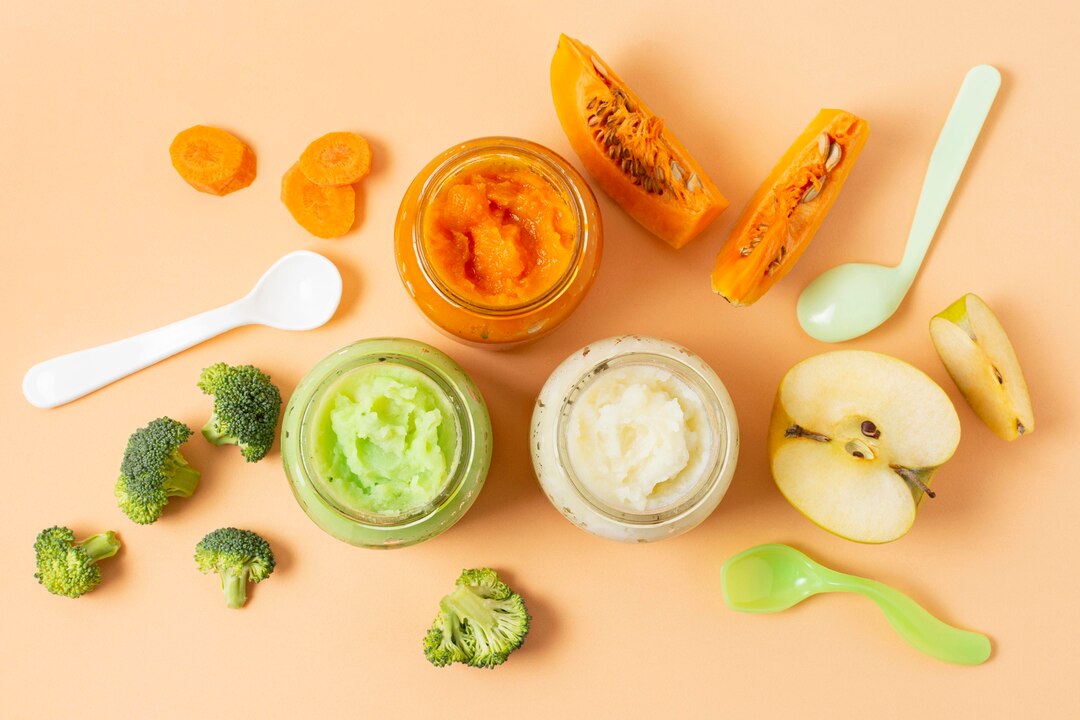Weaning is an exciting milestone in a baby’s journey, as they transition from breast milk or formula to solid foods. It’s essential to introduce healthy, nutrient-dense foods to ensure your baby gets the best start to their growing years. While every baby is different, there are some foods that are widely recommended for their nutritional benefits and ease of digestion. Here’s a guide to the top 10 healthy baby weaning foods and how to start them.
1. Pureed Vegetables
Vegetables like sweet potatoes, carrots, peas, and pumpkin are excellent weaning foods. They are rich in vitamins and minerals, such as vitamin A, fiber, and antioxidants, which are essential for your baby’s growth.
How to Start:
Start with one vegetable at a time to check for any potential allergies. Cook the vegetable thoroughly until soft, then puree it until smooth. You can gradually add water, breast milk, or formula to achieve the right consistency for your baby.
2. Mashed Avocado
Avocados are packed with healthy fats, which are important for brain development. They also contain fiber, vitamins, and minerals that support your baby’s overall health.
How to Start:
Simply mash a ripe avocado with a fork until smooth. You can add a small amount of breast milk or formula to make it creamier. Avocado is easy for babies to swallow, and it’s perfect for introducing healthy fats.
3. Pureed Fruits
Fruits like apples, pears, bananas, and peaches are sweet, easy-to-digest options that are rich in vitamins, fiber, and antioxidants. They also provide natural sugars for energy.
How to Start:
Start with fruits that are soft and easy to puree. Cook apples and pears to soften them, or serve ripe bananas as is. Introduce one fruit at a time, and mix with a little water or breast milk if needed.
4. Oatmeal or Porridge
Oatmeal is a whole grain that’s rich in iron, fiber, and B vitamins, which are important for your baby’s development. It’s a great food to start with since it’s mild in flavor and easy to digest.
How to Start:
Begin with a smooth, runny consistency, mixing oats with water, breast milk, or formula. Gradually thicken it as your baby gets used to eating solids. You can add pureed fruits for extra flavor and nutrition.
5. Rice Cereal
Rice cereal is often one of the first weaning foods given to babies. It’s mild, easy to digest, and fortified with iron, which helps prevent iron deficiency.
How to Start:
Mix rice cereal with breast milk or formula to make a smooth, runny consistency. Gradually increase the thickness as your baby becomes accustomed to swallowing solids. You can introduce other grains like barley and quinoa as your baby grows.
6. Mashed or Pureed Meat
As your baby gets older, introducing small amounts of protein is essential for their muscle development. Soft, well-cooked meats like chicken, turkey, or beef can be pureed to a smooth texture.
How to Start:
Cook the meat until soft, then puree or mash it to a smooth consistency. You can add a little water or broth to thin the texture. Start with small portions, and ensure the meat is finely mashed or pureed to avoid choking hazards.
7. Egg Yolks
Egg yolks are rich in healthy fats, protein, and essential nutrients like choline, which supports brain development. They are an excellent source of nutrition when introduced properly.
How to Start:
Hard boil an egg, remove the egg white, and mash or puree the yolk. You can mix the egg yolk with breast milk or formula to make it easier for your baby to swallow. Wait until your baby is about 6 months old before introducing eggs to reduce the risk of an allergic reaction.
8. Lentils and Beans
Lentils and beans are excellent sources of protein, iron, and fiber. They are perfect for supporting your baby’s growing body and digestive health. However, they need to be cooked thoroughly and pureed to make them safe and digestible for babies.
How to Start:
Cook lentils or beans until soft and then blend them to a smooth consistency. You can mix them with vegetables or grains to make a balanced meal. Gradually introduce beans and lentils as part of a varied diet.
9. Full-Fat Plain Yogurt
Yogurt is a great source of calcium, protein, and probiotics, which are beneficial for your baby’s digestive system. Opt for full-fat, plain yogurt without added sugars for the best nutritional value.
How to Start:
Start with a small spoonful of yogurt, and you can mix it with mashed fruits like banana or berries for added flavor. Make sure to avoid flavored yogurts, as they may contain added sugars.
10. Cottage Cheese
Cottage cheese is a mild, easy-to-eat dairy product that is rich in protein and calcium. It also has a creamy texture that many babies enjoy as they begin to explore new textures.
How to Start:
Offer small spoonfuls of cottage cheese to your baby as a finger food or mix it with pureed fruits or vegetables. Be sure to choose full-fat, unsweetened cottage cheese.
How to Start Weaning
Starting the weaning process can seem overwhelming, but it doesn’t have to be. Here are some simple steps to follow when introducing solids to your baby:
- Timing: Most babies are ready for weaning at around 6 months of age, but consult with your pediatrician before starting. Look for signs that your baby is ready, such as sitting up with support, showing interest in food, and being able to grasp and bring objects to their mouth.
- Introduce One Food at a Time: Start with one food and give it to your baby for 3-5 days to monitor for any allergic reactions or sensitivities.
- Start Slow: Begin with small amounts and gradually increase the portion sizes as your baby gets used to eating solids. Start with smooth, runny textures and move towards chunkier consistencies as your baby’s skills develop.
- Be Patient: Every baby is different. Some babies may take to solids quickly, while others may take their time. Keep offering new foods and be patient—don’t force your baby to eat if they’re not interested.
- Avoid Choking Hazards: Always ensure that the foods you offer are cooked thoroughly and pureed or mashed to the right consistency for your baby’s age. Avoid foods that are hard, round, or a choking hazard.
Weaning is an important stage in your baby’s growth and development, and introducing healthy, nutritious foods will set them on the path to lifelong good health. By offering a variety of foods such as pureed vegetables, fruits, grains, proteins, and dairy, you can help ensure that your baby receives the essential nutrients they need to thrive. Remember to take it slow, be patient, and enjoy this exciting milestone in your baby’s journey.








